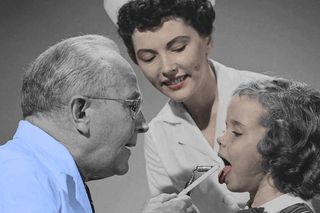
What to Do When A Child Is Scared of The Doctor
We’re assuming your pediatrician is not Dr. Frankenstein.

For some families, taking kids to visit the doctor is nothing short of a mission impossible involving tears and tantrums. A fear of going to the doctor tends to crop up most in toddlers and preschoolers, who often experience what seem to be many such ‘irrational fears.’ And yet, doctor visits can’t be avoided — vaccines, to be effective, must be received according to schedule, childhood ailments need to be treated, and parents need assurance their child is developing properly. So, what to do when your child is scared of the doctor?
How to overcome a child’s fear of going to the doctor
Ask why they are afraid.
Finding out why your child is afraid of the doctor is the first step in getting them there. For many kids, the first interaction with their pediatrician is when the doctor gives them a vaccine. Often this association becomes implanted in their mind; a child who is scared of the doctor is often a child who is scared of injections.
But don’t assume it’s a fear of needles that is making a kid dread the doctor’s office. Ask and hear them out, be respectful and convey that you understand their feelings, but also encourage them to face their fears. If it’s something specific that frightens your child, you can brainstorm together ways to deal with that fear, so they go into the office feeling like they have a strategy to cope.
Talk to kids about why they’re going to the doctor.
Explaining the purpose of the doctor’s visit might help take the edge off. “When kids are anxious about going to the doctor they’re often imagining something much worse than what’s actually going to happen,” says Dr. Rachel Busman, a clinical psychologist at the Child Mind Institute. If your child is afraid of the doctor because they’re afraid of shots, it will probably help them to know that they won’t be getting one. At the same time…
If they ask, be honest about whether they should expect pain — but downplay the degree.
Lying to anxious kids about what will happen at the doctor’s office will only make their fear worse and make them trust you less. If they ask whether something will hurt, don’t lie — but don’t go into detail. A casual “it might,” or “maybe a little, but then it will be over in a second,” helps prepare kids without intensifying the pain in their minds.
“…both healthy and anxious children’s experience of pain is influenced by what they are told about it. If we tell them they will experience a lot of pain – or they tell themselves this – they will actually experience more pain and greater negative emotions as a consequence,” concluded a recent study into how kids’ perceive pain.
The authors of that study suggest providing a benign comparison for children — for instance, instead of comparing the expected pain to a pinch, try “this is going to feel like a branch scraping against your skin.”
Bring distractions.
Distracting kids by singing songs, asking open-ended questions, reading books, playing with a new toy, watching a video, or even by coughing right before the injection, can decrease anxiety, studies (and common sense) show.
Talk up how great the doctor is.
Shows and books that encourage portray doctors in a positive light can be a fun way to prepare kids for a doctor’s appointment. Kid’s shows like Doc McStuffins, or Sid the Science Kid, can create a better association for kids, than, say, one involving needles and pain, suggests pediatrician Jennifer Shu.
Reward them.
Rewarding your child for facing their fear of the doctor is one of the best ways to communicate what kind of behavior is desirable, and therefore, a good investment toward an easier experience next time. The reward will vary depending on what would be meaningful to the child. The important thing is to convey that facing their fear and making an effort at self-control is what’s being rewarded.
Related:
Related


Kids Need More Strong, Female Characters in the Shows They Watch
